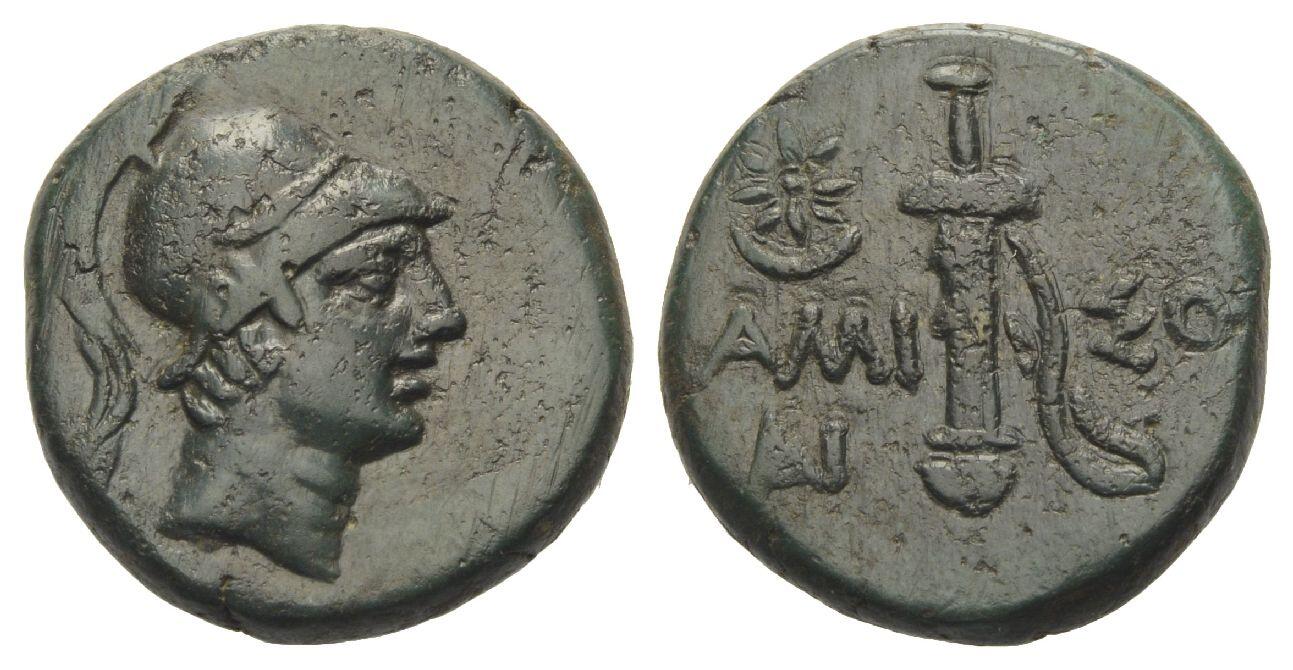3386 - Amisus (AE Aegis/Nike) over Pontic type (Ares/sword) (Vienna, Kunsthistorisches Museum, 15073): Difference between revisions
From SILVER
No edit summary |
No edit summary |
||
| Line 17: | Line 17: | ||
|Denomination=Tetrachalkon | |Denomination=Tetrachalkon | ||
|Coin reference=Callataÿ 2007, p. 288 (Amisos, no. 4) | |Coin reference=Callataÿ 2007, p. 288 (Amisos, no. 4) | ||
|Coin series reference=SNG BM Black Sea, no. 1177-1191; Callataÿ 2007, p. 288 (Amisos, no. 4); | |Coin series reference=SNG BM Black Sea, no. 1177-1191; Callataÿ 2007, p. 288 (Amisos, no. 4); HGC 7, n° 242 | ||
|Overstruck obverse description=Helmeted head of Ares right | |Overstruck obverse description=Helmeted head of Ares right | ||
|Overstruck reverse legend=(name of the city) | |Overstruck reverse legend=(name of the city) | ||
Revision as of 17:44, 28 November 2022
95 BCE - 85 BCE | AMIΣOY
Location/history
| Museum collectionMuseum collection: | Vienna, Kunsthistorisches Museum, 15073. | |
Overstriking coin
Description
| ObverseInscription or printing placed on the obverse.: | Aegis with Gorgoneion in centre. | ReverseInscription or printing placed on the reverse.: | AMIΣOY (Greek) Nike advancing right, wearing chiton, holding wreath and palm. In field, monograms. |
Mint and issuing power
| MintIdentifies the place of manufacture or issue of a numismatic object.: | Amisus | Ancient regionAncient region. | Pontus | Modern countryModern country: Turkey | AuthorityIdentifies the issuing power. The authority can be "pretended" when the name or the portrait of X is on the coin but he/she was not the issuing power. It can also be "uncertain" when there is no mention of X on the coin but he/she was the issuing power according to the historical sources: | Mithridates VI Eupator (king of the Pontic kingdom, c. 120-63 BC) |
Chronology
| FromIdentifies the initial date in a range assigned in a numismatic context. 95 BCE toIdentifies the final date in a range assigned in a numismatic context.. 85 BCE | Hellenistic 323-30 BC |
Physical description
| MetalThe physical material (usually metal) from which an object is made.: Bronze |
WeightWeight of the numismatic object (in grams). in grams: 7.797.79 g <br />7,790 mg <br /> | DenominationTerm indicating the value of a numismatic object. Examples: tetradrachm, chalkous, denarius.: Tetrachalkon | |
References
| Coin referenceReference of the Coin: | Callataÿ 2007, p. 288 (Amisos, no. 4) | Coin series referenceReference to coin series study: | SNG BM Black Sea1SNG BM Black Sea, no. 1177-1191, Callataÿ 20072Callataÿ 2007, p. 288 (Amisos, no. 4), HGC 73HGC 7, n° 242 |
Overstruck type
Description
| ObverseInscription or printing placed on the obverse.: | Helmeted head of Ares right | ReverseInscription or printing placed on the reverse.: | (name of the city) (Greek) Sword in sheath |
Mint and issuing power
| MintIdentifies the place of manufacture or issue of a numismatic object. ᵖ: | Amisus | Ancient regionAncient region. ᵖ | Pontus | Modern countryModern country: Turkey | AuthorityIdentifies the authority in whose name (explicitly or implicitly) a numismatic object was issued. ᵖ: |
Chronology
| FromIdentifies the initial date in a range assigned in a numismatic context. 110 toIdentifies the final date in a range assigned in a numismatic context.. 90 | Hellenistic 323-30 BC |
Physical description
References
| Coin type referenceReference to coin series study ᵖ: | Hoover 20124Hoover 2012, no. 237 |
Additional data
| Frequency of overstrikesFrequency of overstrikes: | rare and spread | Level of confidenceLevel of confidence of the identification: | sure |
| RemarksRemarks: | overstruck on ‘Ares/Sword’ | ||
References
- ^ Price, Martin J. (1993), Sylloge Nummorum Graecorum, Great Britain, Volume IX, British Museum, Part 1: The Black Sea, London, [132] p. : ill. ; 31 cm.
- ^ Callataÿ, François de (2007), "La révision de la chronologie des bronzes de Mithridate Eupator et ses conséquences sur la datation des monnayages et des sites du Bosphore Cimmérien", in A. Bresson, A. Ivantchik and J.-L. Ferrary (ed.), Une Koinè pontique, Bordeaux, 2007, p. 271-308.
- ^ Hoover, Oliver D. (2012), Handbook of Greek Coinages. 7. Coins of northern and Central Anatolia - Pontos, Paphlagonia, Bithynia, Phrygia, Galatia, lykaonia, and Kappadokia (with Kolchis and the Kimmerian bosporos), Lancaster, lxxxii, 352 p. : ill. ; 23 cm.
- ^ Hoover 2012

